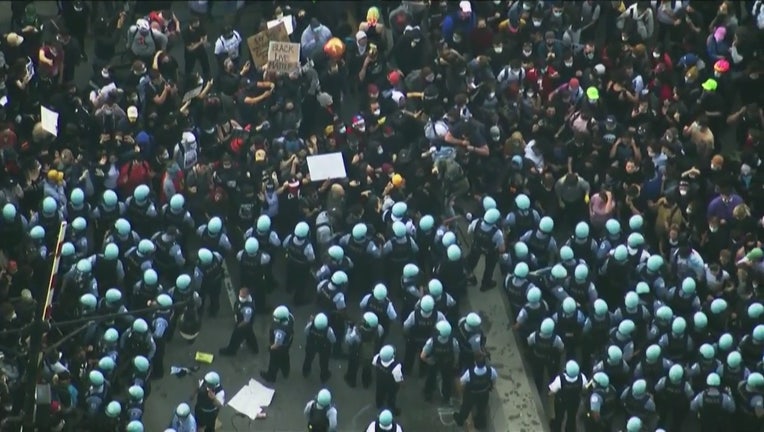Massive US protests raise fears of new virus outbreaks

LOS ANGELES - The mayor of Atlanta, one of dozens of U.S. cities hit by massive protests in recent days, has a message for demonstrators: “If you were out protesting last night, you probably need to go get a COVID test this week.”
As more beaches, churches, schools and businesses reopened worldwide, civil unrest in the United States over repeated racial injustice is raising fears of new coronavirus outbreaks in a country that has seen more infections and deaths than anywhere else in the world.
Atlanta Mayor Keisha Lance Bottoms warned that “there is still a pandemic in America that’s killing black and brown people at higher numbers.”
Violent protests over the death of George Floyd have shaken the country from New York City to Minneapolis, from Atlanta to Los Angeles. Some protests have turned into riots and clashes with police, leaving stores burned and torched cars in the streets. City officials have ordered overnight curfews to quell the violence.
Floyd, a black man, died on May 25 in Minneapolis after a white police officer pressed a knee into his neck. It was the latest in a series of deaths of black men and women at the hands of police in America.
Health experts fear that silent carriers of the virus who have no symptoms could unwittingly infect others at protests where people are packed cheek to jowl, many without masks.
“Whether they’re fired up or not, that doesn’t prevent them from getting the virus,” said Bradley Pollock, chairman of the Department of Public Health Sciences at the University of California, Davis.
The U.S. has seen over 1.7 million infections and nearly 104,000 deaths in the pandemic, which has disproportionately affected racial minorities in a nation that does not have universal health care.
The Minnesota health commissioner warned that the protests are almost certain to fuel new infections.
“We have two crises that are sandwiched on top of one other,” Minneapolis Mayor Jacob Frey said.
Even for the many protesters wearing masks, those don’t guarantee protection. The U.S. Centers for Disease Control and Prevention says cloth masks keep infected people from spreading the virus but are not designed to protect wearers from getting it.
On Sunday, many Americans were returning to in-person church services for the first time in many weeks as some emergency measures are lifted and mosques reopened across the Middle East, but in countries from India to Colombia the number of new infection was still on the rise.
In Europe, unions in Paris flouted a ban on large gatherings Saturday to protest the dire conditions facing workers in the country illegally. Police used tear gas to disperse the crowds and said they had banned the march due to health risks.
Hong Kong police have used tear gas, pepper spray and rubber bullets to break up protests in recent weeks. A ban on gatherings of more than eight people has been extended to June 4, the day of an annual candlelight vigil to mark the Chinese military’s 1989 crackdown on pro-democracy demonstrators in Beijing’s Tiananmen Square.
More than 6 million infections have been reported worldwide, with nearly 370,000 deaths, according to a tally by Johns Hopkins University. The true death toll is believed to be significantly higher, with experts saying many victims died of the virus without ever being tested.
The situation worsened Sunday in India, where new daily cases topped 8,000 for the first time and 193 more deaths were reported. India still is easing restrictions on shops and public transport in more states beginning Monday, although subways and schools will remain closed.
In Saudi Arabia, tens of thousands of mosques reopened Sunday for the first time in more than two months, but Islam’s holiest site in Mecca remained closed. In Jerusalem, throngs of worshippers waited outside the Al-Aqsa Mosque before it reopened. Many wore surgical masks and waited for temperature checks as they entered.
In Bogota, the capital of Colombia, authorities were locking down an area of nearly 1.5 million people as cases continued to rise.
Bogota Mayor Claudia Lopez said no one in the working-class Kennedy area — inaugurated by late U.S. President John F. Kennedy in 1961 — will be allowed out, except to seek food or medical care or in case of an emergency. Factories that had been allowed to operate must close. The area has reported more nearly 2,500 infections and hospitals are reaching their limits.
Elite sporting events will be allowed to resume in England starting Monday, but without spectators, paving the way for the planned June 17 return of the Premier League, the world’s richest soccer competition.
But England’s deputy chief medical officer Jonathan Van-Tam warned that the situation remained precarious. Britain has seen nearly 38,500 deaths in the pandemic, the second-highest number of confirmed virus deaths after the United States.
“I believe this is also a very dangerous moment,” he said. “We have to get this right.”
Pope Francis, meanwhile, cautioned against pessimism as people emerge from coronavirus lockdowns.
During Mass in St. Peter’s Basilica to mark Pentecost Sunday, Francis noted a tendency to say that “nothing will return as before.” That kind of thinking, Francis said, guarantees that “the one thing that certainly does not return is hope.”
RELATED STORIES:
At least 3 dead after violent protests sweep the nation
DC police brutality protests devolve into looting as chaos grips capital

